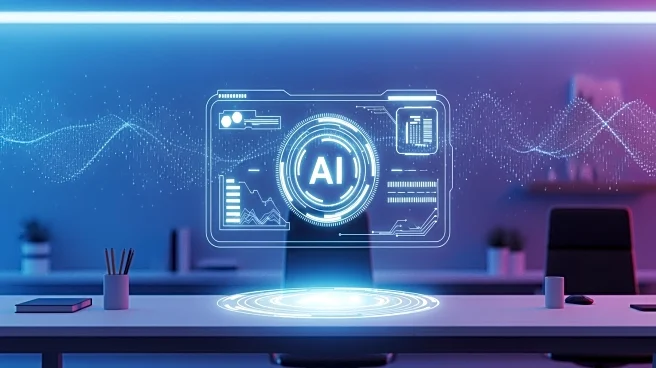What's Happening?
Artificial intelligence is becoming a significant factor in the Indian workforce, surpassing traditional motivators such as salary and workplace stress. According to Indeed's 2025 Workplace Trends Report, 71% of Indian workers are utilizing AI to solve
problems, plan careers, and test ideas. This trend reflects a shift towards technology-driven solutions in the workplace, with AI serving as a trusted companion that aids strategic thinking and decision-making. The report, which surveyed 3,872 respondents across 14 industries, highlights the rise of 'skill nomadism,' where workers frequently change roles and acquire new skills to remain employable. Additionally, practices such as micro-retirements and moonlighting are becoming popular among younger professionals, with 68% of entry- and junior-level staff experimenting with new career strategies.
Why It's Important?
The increasing reliance on AI in the workplace signifies a transformative shift in how work is conducted and valued. This trend could lead to more objective and data-driven decision-making processes, potentially addressing gender biases and promoting equality. As AI becomes integral to career planning and problem-solving, it may redefine job roles and expectations, impacting job security and employee satisfaction. Employers may need to adapt to these changes by offering more flexible work arrangements and focusing on skill development to retain talent. The shift towards AI-driven work environments could also influence global workforce trends, as other countries observe and potentially adopt similar practices.
What's Next?
As AI continues to shape workplace dynamics, employers and policymakers may need to address the implications of these changes. This could involve revising employment policies to accommodate new work practices such as skill nomadism and micro-retirements. Additionally, there may be a need for increased investment in AI technologies and training programs to ensure workers are equipped with the necessary skills. The evolving landscape may also prompt discussions on ethical considerations surrounding AI use in the workplace, including privacy concerns and the potential for job displacement.
Beyond the Headlines
The integration of AI into the workforce raises ethical and cultural questions about the future of work. As AI becomes more prevalent, there may be concerns about the balance between human and machine decision-making, as well as the potential for AI to perpetuate existing biases if not properly managed. The cultural shift towards technology-driven work environments could also impact traditional work values and practices, leading to a reevaluation of what constitutes meaningful work.















